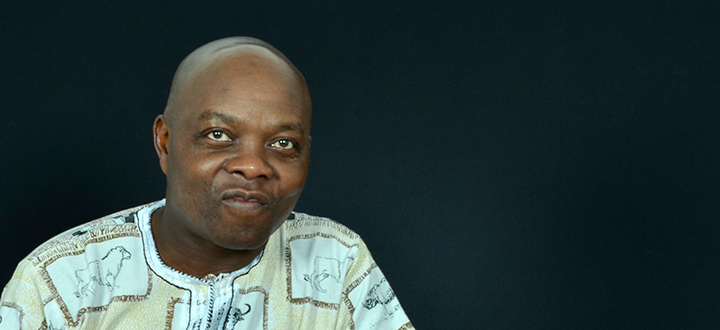

Ayanda Noma (Director: Innovation and Technology Transfer) and Prof Thenjiwe Meyiwa (Vice-Principal: Research, Postgraduate Studies, Innovation and Commercialisation) congratulate Prof Titus Msagati (NanoWS) (centre) on his First Patent Granted in South Africa Award: Recovery of Crude Oil.
A unique African technology that can clean up crude oil and petrol spills in water while making both the oil and the water usable again, has been patented in South Africa.
"Oil spillages are not such regular occurrences in Africa, but when they occur, they wreak havoc on the environment and can become a major health hazard. Our team of researchers from Nigeria and South Africa wanted to ensure that when a spillage happens, we have a solution ready," says Prof Titus Msagati of the Nanotechnology and Water Sustainability (NanoWS) research unit at Unisa.
He was one of the prizewinners at Unisa’s 2020 Research & Innovation Awards on 6 March, receiving the First Patent Granted in South Africa Award: Recovery of Crude Oil for the innovation.
This solution, designed by researchers from NanoWS and the University of Nigeria, has several characteristics that cause it to stand out. For one, it uses filters made from modified waste material in the form of expanded polystyrene, commonly used to package consumer electronic goods.
Since expanded polystyrene is widely available across the continent, the solution’s filters could be manufactured locally and inexpensively. This could make them substantially more affordable than other solutions of this kind, usually made from polymers, with the cost difference potentially running into hundreds of thousands of rands.
But expanded polystyrene on its own cannot be used to mop up an oil spill. It first has to be modified, using a material and process that form part of the patent. Once modified, the polystyrene can perform two functions simultaneously: on the one hand, it can repel water, and on the other, trap oil or petrol.
"The material we add to the polystyrene makes the filters super-hydrophobic so that they repel water while enhancing their ability to attract the oil," Msagati explains. "We then create one channel that separates and directs the water to one container, and another channel with liquid that dissolves the trapped oil and pushes it into a separate container."
South Africa's water boards, oil-refining companies and NGOs working with water issues are already well aware of the Unisa-University of Nigeria innovation and are eagerly watching its progress.
However, the recovered water would not be suitable for drinking unless it has been purified further, he adds. "Oil and water do not mix but there is an intermediate layer where some mixing will occur, making it unsuitable for drinking. However, our technology should be able to separate the oil from the water to safeguard the water and life, and leave the environment clean."
Depending on the water quality, the recovered water can then be used for fit-for-purpose applications, such as washing vehicles. "We have analytical chemists on our research team to measure and determine the quality," says Msagati.
The multidisciplinary research team also consists of chemical engineers, hydrologists and materials engineers. These diverse skills are needed as the design and configuration of the solution would differ depending on the contamination scenario, whether of a dam, river or underground water source. Oil spillages affecting underground water would have to involve additional resources such as water pumps, requiring different design elements.
"We already have a basic system that we have tested and are busy working on the prototype in the laboratory. The solution will then have to be commercialised," Msagati says, adding that South Africa’s water boards, oil-refining companies and NGOs working with water issues are already well aware of the Unisa-University of Nigeria innovation and are eagerly watching its progress.
"Government is much stricter on water pollution and allowable amounts of hydrocarbons in water are much lower than before," he says. "Industry is under pressure to comply and this solution has great potential as it uses locally available materials and skills to solve local problems affordably."
* The patent was filed in 2015 and awarded to Unisa in October 2019 as the research was conducted in South Africa at Unisa facilities. The researchers are Prof Titus Msagati of Unisa and four researchers linked to the University of Nigeria, namely Peter Olaitan Aiyedun, Akinola Kehinde Akinlabi, Samson Oluwagbemiga Alayande and Enock Olugbenga Dare.
* By Clairwyn van der Merwe, Contract writer, Directorate of Research Support
Publish date: 2020/03/12